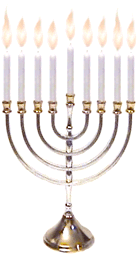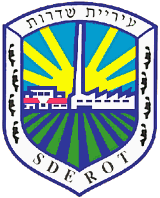
Tonight marks the first night of Hannukah, the Festival of Lights .
While many of you may be familiar with the story of the Miracle of the Oil, what is frequently overlooked is that Hannukah celebrates another miracle - the miracle of a group of farmers and tradesman utterly defeating the professional armies of the Seleucid Empire, a victory for freedom that belongs to all of us alike, Jew and Gentile.
Hanukkah celebrates one of the important miracles in Jewish history and reminds us of the triumph of faith. It takes place every year,usually in mid to late December, but this year it coincides with the American Thanksgiving, something that won't occur again for something like 70,000 years. While its date varies if you go by the western calendar, in the Hebrew calendar Hanukkah always falls on the 25th day of Kislev.
Hanukkah celebrates the victorious Jewish war for independence in the second century B.C. E. The story is told in the First Book of Maccabees, and retold in the Second Book of Maccabees. A contemporary military history of the war can be found in Battles of the Bible, coauthored by Chaim Herzog and Mordechai Gichon.
After his death, Alexander the Great's empire broke into several parts, and Israel was under the control of the Seleucid empire, based in Syria. Israel had lived peacefully under the Persian Empire and under the Ptolemic empire (of Egypt), both which tolerated Judaism; but the Seleucid Emperor Antiochus Epiphanes was an arrogant, bigoted Hellenizer, who attempted to force the Jews to abandon their religion and to adopt the Seleucid's Greek customs and worship,which included idolatry.
There were those Jews who considered themselves `modern' and `assimilated' who were willing to go along with this, even to the extent of having surgical operations to reverse circumcision.
Others did not, and they were prosecuted vigorously and brutalized by the Seleucid Greeks.
The start of the Maccabean Revolt sprang from a single spontaneous act of resistance. In the foothills village of Modiin in 167BCE, a Greek army unit set up an altar, and ordered the local Jewish rabbi, Mattathias, to sacrifice a pig and eat it. He refused, as did his five sons. When a Jewish collaborator came forward to offer the sacrifice, a furious Mattathias "ran and killed him on the spot, killed the king's officer who was forcing them to sacrifice, and tore down the altar" (1 Mac. 2:15-25).
Mattathias, his sons and their followers then headed for the Judean hills, to launch a guerrilla war. They were farmers who had no military training,fighting a professional army. There had not been a Jewish army since Babylon had destroyed the Judean kingdom four centuries before. Their only weapons were farming tools and whatever simple weapons they could construct, such as maces or slings. During this first year, Mattathias died, and his middle son Judah took over command as his successor.
Nicknamed "the hammer" ("Maccabee," in Hebrew), Judah constructed a guerrilla army that staged daring nighttime raids on the Greek outposts, then melted back into the countryside. His successes attracted more supporters, and the revolt spread.
The war went on for 25 years, one of the most singular wars for independence in history. The miracle, perhaps is that it was fought at all, let alone won.
The Seleucids and Antiochus sent huge, well equipped armies into Israel to subdue the Jews. They were all defeated, at odds that seem miraculous even today. Judah Maccabee turned out to be a tactical genius, using unheard of tactics, leading the Greek phalanxes into the hills where they could not maneuver and destroying them.
To give you an idea of how essential the Jewish heartland of Judea and Samaria was and is to Israel's survival then and now, the map below shows where the major battles of the war took place.(hat tip, Carl) Click on it to enlarge it:

One thing that is seldom mentioned about the war is the fact that a significant part of it took place against the Hellenized, `modern',`assimilated' Jewish traitors I mentioned earlier, who were more than willing abandon the Jewish way of life and supported their Seleucid masters against their fellow Jews.
As Ecclesiastes famously said in the Megillot, there's nothing new under the sun.
In 164 BCE, the Jews defeated a force commanded by the Viceroy Lysias that outnumbered them two to one. That battle took place six miles north of Hebron, near the Jewish fortress of Beth-zur. The victory allowed Judah and his army to retake Jerusalem.
When they entered Jerusalem, Judah and his followers entered the Holy Temple on the Temple Mount. The Temple had been wrecked and horribly desecrated, with profanities scrawled on the walls and the Ark by the Seleucids.
The Maccabees built a new altar. When the time came to light the N'er Tamid, the Eternal Light of the Temple, the Jews could find only one sanctified jar of oil marked with the seal of the High Priest. It was only enough to last one evening. On the 25th of Kislev, in the year 164 BCE,the lamp was lit with this small jar of oil and, miraculously, stayed lit for eight days, until more oil suitable for the temple was made. The eight days of Hanukkah celebrate that miracle, as well as the divine intervention that had led the Jews to amazing victories over well-equipped professional armies far superior in numbers. "Therefore, carrying ivy-wreathed wants and beautiful branches and also fronds of palm, they offered hymns of thanksgiving to him who had given success to the purifying of his own holy place" (2 Mac. 10:7).
The war itself continued. In 160 BCE, near modern-day Ramallah, Judah was killed, but Judah's brother Jonathan, and then his brother Simon took command of the Jewish army, finally winning complete independence in 142 BCE. At last, "All the people sat under their own vines and fig trees, and there was none to make them afraid" (1 Mac. 14:12).
The War of the Maccabees was the first war ever fought for religious freedom. Somehow, a group of farmers with no military training who refused to bow to their oppressors defeated a mighty empire and its immense standing armies. There seems to be no plausible explanation for the victory of the Jews except that it was a miracle.
Towards the end of the war, Antiochus and the Seleucids became so obsessed with defeating the Isrselites that they sacked their own cities and sold their own citizens into slavery to get money to pursue the war against the Jews.
Hanukkah reminds us that with G-d's help, victory over evil is assured and no miracle is impossible. Modern Israel and the survival of the Jewish people against all odds are proof of that.
Symbols in Hanukkah
Aside from the Hanukkiah (candlesticks), the other great symbol of Hanukkah are those small spinning tops known as dreidels.
The four letters which appear on the four corners of a dreidel allude to the miracle of Hanukkah. They spell out: Nes (N-miracle), Gadol (G-great), Haya (H-happened) and Sham (S-there, meaning in Israel). Or, `a great miracle happened there.'
Indeed it did.
Chag Sameach! Happy Hanukkah!






4 comments:
Happy Hanukkah Rob!! Than you for sharing these stories about ancient Israel. Since G_d has protected them in the past and we know from the Biblical Scriptures God's plan for the Jewish people, we can safely assume that God will deliver them in the present and the future.
I think it's really cool that Hanukkah begins on the same day as Thanksgiving this year. It's especially cool when learning this will not happen again for another 70,000 years or so and we are alive at this time to see it!!
When reading what you've written about the War of the Maccabees and how G_d delivered the Israelites, I notice a number of similarities to this and to how America began. While the situation faced by the ancient Israelites was not exactly like the situation faced by the original American colonies or those who fought the revolutionary war, there do seem to be a number of similarities.
For example the original colonists had to learn to live off the land and they had to go up against highly trained warriors in the Indians who were, in many cases, determined to exterminate them and to achieve independence our ancestors had to go up against the British empire the most powerful on earth at the time. The odds were very much against our ancestors as they were very much against the ancient Israelites. Yet G_d delivered both the ancient Israelites and the founders of America.
We know G_d's plan for Israel from the Holy Scriptures. While we cannot ascertain with any certainty from these scriptures the future of America, perhaps G_d will continue to extend to it the same mercy as has been extended to Israel. Again, I think its really cool that the beginning of Hanukkah and Thanksgiving are on the same day and it won't occur again for another 70,000 years and we were here to see it.
While we cannot say for certain precisely what symbolism may be evident in this, I certainly hope and pray that this is a sign of good things to come and that G_d's mercy and protection will be extended to America and that G_d will deal with our nation in such ways as to bring about genuine repentance and service to him.
I've noticed that generally G-d worshiping Jews do not fully spell out the name G-d. Would you please be kind enough to explain the reasoning for this?
G-d bless you and yours on this day and all days!!
Again, happy Hanukkah and many more!!
Hi Poster,
Thanks for the kind words and good wishes.
To answer your question, for many observant Jews the name of G-d is a holy and powerful thing, and not to be invoked in casual conversation. Many Jews use 'Hashem' in those circumstances, which literally means 'the Name'.
This is also written in scripture, in Shemot (Exodus) 20:7 “You shall not misuse the name of HaShem your G-d, for HaShem will not hold anyone guiltless who misuses his name."
I hold with that.
Regards,
Rob
Thank you for the clarification on this!! Again, G-d bless you and yours. Hope you've had a blessed Hanukkah and Thanksgiving.
I love the story behind Hannukah.
Another great story of a tyrant (Antiochus IV) getting his just deserts, and from a people who he thought were beneath him.
Post a Comment